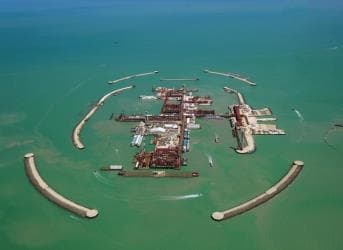A "new paradigm" shift in the economic model for Kazakhstan may suggest its hopes for a major windfall from the Kashagan oil field are fading.
The Asian Development Bank (ADB) announced it signed a framework agreement on May 4 in Astana to help the oil-rich Central Asian country with economic diversification. The bank said the “landmark agreement” establishes a "new paradigm partnership on the country’s development agenda."
ADB President Takehiko Nakao signed the co-financing framework agreement with Kazakh Prime Minister Karim Massimov.
Oil consumption in Kazakhstan is low, meaning the country can designate most of its production for exports. The energy sector accounts for about 40 percent of government revenue but well over half of its export earnings.
In April, a delegation from the International Monetary Fund visited Kazakhstan to get a first-hand look at its finances. Though its economy performed well in 2013, the IMF said its growth rate was losing momentum.
Growth projections from the IMF were lowered from an earlier estimate of 5.75 percent to 4.75 percent growth for 2014. Kazakhstan, the fund said, has fared well compared to other oil exporting nations, though diversification was essential for continued success.
"More broadly, it will be important to ensure that spending on development and diversification programs is transparent and in line with capacity and high standards of efficiency in order to guard against the resource curse," the IMF warned.
Related Article: Kashagan Delays Spell Investor Risk In Kazakhstan
Oil production in 2013 averaged around 1.64 million barrels per day and most of that came from the Tengiz and Karachaganak onshore oil fields. Kashagan, the fifth largest oil field in the world, could provide a further boost to Kazakhstan's economy, though development has been curtailed by pipeline problems at the offshore field.
In April, Italian energy company Eni said pipeline problems associated with Kashagan were "worse than we considered." The entire pipeline network may have to be replaced with an alloy resistant to the corrosive hydrogen sulfide present in the field. Kashagan began operations very briefly in late 2013 and production isn’t expected to begin again until at least 2015.
For the IMF, the ongoing skirmish between Russia and Ukraine could add another layer of risk to Kazakhstan's economic development, given Astana’s strong financial ties to Russia. Midterm, the Fund said, stronger growth prospects are tied to the uncertainty surrounding Kashagan.
With the ADB agreement, Astana may be hedging its bets.
By Daniel J. Graeber of Oilprice.com


















